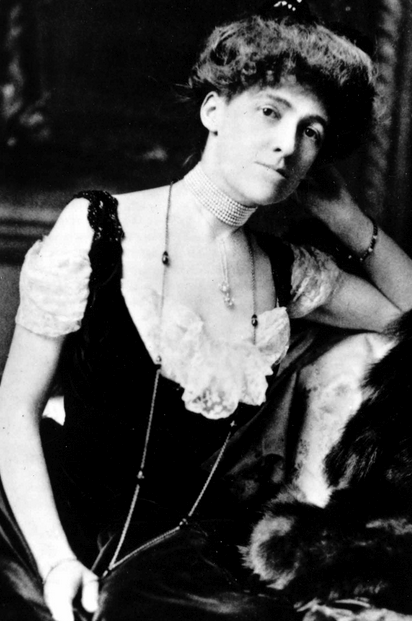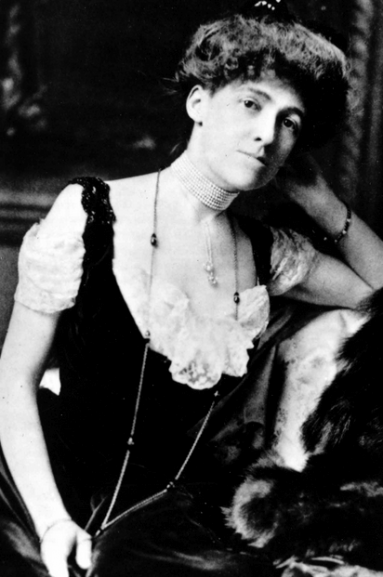I'll be posting actual content this week, but for today I'm just getting into the swing of things, so here's my warmup: For only two dollars—yes, two American dollars!—a month, you can get a subscription to The New Inquiry's digital magazine. This month's theme? Beauty. I was enlisted to play the role of co-editor this issue, in part because several of my favorite interviews have been repurposed, and in part because it features my response to Jonathan Franzen's assertion in The New Yorker that Edith Wharton's lack of physical beauty was one of the few things making her sympathetic.
You'll have to subscribe to read my whole critique of his (baffling) position; unsurprisingly, I think it's shortsighted nonsense. But here's a recurring thought I had when writing it that I didn't put in there because I didn't want to detract from my own argument: Edith Wharton wasn't ugly. I don't usually make proclamations about any individual woman's beauty on here, but what the hell, she's dead.
The obvious argument that I tried to circumvent in the piece was that female writers will forever be judged on the way we look, something my own experience has backed up when I've published on sites other than those explicitly aimed at a female audience. But when I saw Wharton's utterly normal features, I actually guffawed, because it illuminated another point entirely: It doesn't matter what female writers actually look like, and not just because we're screwed either way (too pretty to be taken seriously/too ugly to hook in the public to read what she's actually written). We've come to the point where we all understand that women's looks must matter to her creative work, so Franzen can assert Wharton's appeal and use that as a baseline for his argument, regardless of the looks in question. It wasn't until my mother, who has read far more Wharton than I have, pointed out that the photos she'd seen didn't show an ugly woman that I thought to look at photos of her; I was prepared to accept the baseline Franzen provided. He never calls her ugly, just points out how un-pretty she was—but in a piece that hinges upon Wharton's looks, I'd argue the implication is there. And yes, yes, looks are subjective and beauty standards change and blah blah blah. But, I mean, look for yourself. Should this woman's looks inspire 2,000 words in The New Yorker? (Should any woman's looks inspire 2,000 words—words not written by a female writer, incidentally, which I suppose isn't a surprise—in The New Yorker?)
I should note that I'm hardly a Wharton scholar. I don't know her self-perception regarding her looks; I don't know if people treated her as though she were grotesque. And obviously portraiture of the era camouflages flaws to the point where if we had access to snapshots of Wharton I might see the validity of Franzen's assertion about her looks. As is, though, it's bollocks.
The micromarketing of discontinued products.
France has the best hairdressers, and the best beauty workers are in...Britain? Brits are lovely but I suppose I'd never thought of it as a place one would get a luxurious scrub.
Procter & Gamble withdraws support for the conservative American Legislative Exchange Council, which supports gun-friendly bills like the one that meant the Trayvon Martin case would have gone quietly buried had the public outcry not been so large. Good for you, P&G.
Have you received a chain e-mail about an Estee Lauder boycott from Muslims, and why that means if you're pro-Israel you should go out and buy more Estee Lauder? Bogus.
Y'all know I'm skeptical of beauty "studies," but this one (courtesy Jessica Stanley) is piquing my interest. Attractive women who attach photos to résumés receive lower callback rates than "plain" women and women with no photo—if the person looking at résumés works for the company the applicant is submitting to work at. Résumés sent to employment agencies, on the other hand, had a far more diminished effect, regardless of attractiveness. And of course the study authors go to female jealousy as the reason, because bitches be cray-cray. I suspect that the motive here is less "jealousy," as the researchers imply, and more something along the line of the "she thinks she's all that syndrome," which is arguably different than jealousy.
Aaaaaand keeping with the beauty research tip, one of my worst fears about beauty science reporting comes true, with the winner of a British "natural beauty" contest being dubbed as having a "nearly perfect face." And you can't argue with it, because it's science, peeps! The width between her eyes is 44% of her entire face, and 46% is PERFECT. It's basically like the discovery of radium, don't you think? Elizabeth Nolan Brown at Blisstree nails another point: "Celebrating 'natural beauty' as the ideal—while it may be based in a desire to reject over-emphasis on cosmetic enhancements—implicitly (and rather unfairly) prizes people who happened to win the luck of the genetic lottery." All this is a good reason to point you toward Maggie Koerth-Baker's rundown of how to read science news, which you should all bookmark as reference the next time you come across some beauty science piece that makes you feel like crap, or that just generally seems suspicious.
Ads (and potentially other content) projected onto bathroom or salon mirrors. Off the top of my head, I can't think of a worse idea, but gimme a minute.
Minute's up. Eyebrow implants!
Beauty shop opens at Cornton Vale women's prison. "Prison officer Carol Maltman had the idea for the shop after asking prisoners what kind of products would make their lives behind bars more bearable. She was hit with a staggering 1444 suggestions – every one of them relating to cosmetics or toiletries."
This piece on how the Roma people have come to be despised and displaced is fascinating, particularly the section on the creation of the sexually free and alluring "beautiful Gypsy": "The 'beautiful Gypsy' alienates through her secretive unattainability even at the most intimate moments and her withdrawal into a concealed, uncivilised order or animalistic sphere."
Burt Reynolds' 40th anniversary of appearing nude in Cosmo. Am saddened to learn that bearskin rug was intended to be ironic.
Nanoparticles! I don't know what they are exactly, except that they're genetically modified, and the FDA is looking into their use in beauty products. Nanotechnology on your face, yo.
Feminist Philosophers calls bullshit on the "brides are using feeding tubes to lose weight!!!" trend story.
Slate asks if ladymags' insistence on featuring celebrity body woes from women who already fit the beauty ideal is helpful. I waver on this: I think it actually can be a useful stopgap measure, but its effects should be short-term. Seeing someone who looks media-perfect say that they struggle in the same ways I do is a reinforcement that absolutely fucking nobody fits that level of perfection—but as the Slate piece points out, it also provokes the question of, "My god, if she describes herself as hippy, what am I?"
I've got lots of thinking to do on the New Aesthetic and the male gaze, and I'm going to begin with Madeline Ashby and Rahel Aima.
Hair and makeup to camouflage you from digital surveillance. Effin' brilliant. (Thanks to Danielle for the link.)
What's up with Beyonce's whole earth mother thing? Bim Adewunmi looks at "fake authenticity."
Did the public persona of "Black Dahlia," the victim of a highly sensationalized (and highly gruesome) 1947 murder case, begin before her death? Crime historian Joan Renner—who happens to run a vintage cosmetics blog—thinks so, and it's because of her makeup. (Thanks to Sarah Nicole Prickett for the tipoff.)
She rarely writes about beauty so I never have a chance to include her here, but I've gotta give a random shoutout to ModernSauce, the only design-ish blog I read, which I do because the writing makes me laugh out loud, which is potentially hazardous given that I'm often eating graham crackers when I'm reading, and I live alone, and could choke and die and nobody would find me. But despite the hazards, it's so sly and offhandedly insightful, I read on. I read on.
Rebekah gives what might serve as an epilogue for the body hair discussion that took place here a few weeks ago, showing exactly how complex of an issue it is.
Gala Darling's riveting, exploratory, searingly honest piece on self-harm is a must-read for anyone who knows someone who has self-harming behaviors (like cutting). Without glamourizing self-harm in the least, she shows the ambiguities of what it gives its sufferers: "The majority of women who wrote in were not embarrassed by the remnants from their days of self-harm, but instead saw their scars as an integral part of who they are; part of the journey towards loving themselves entirely. In fact, some women were almost proud of their scars, choosing to view them as proof that they could overcome something horrendous & go on to not only survive, but thrive."
The Blind Hem continues the discussion on modesty fashion blogging, this time from a modesty blogger, penned as a response to their earlier piece on the matter, which took a more skeptical view of modesty blogging claims.
An excellent trio of questions from an excellent trio of bloggers: Does your clothing fight your body? Do you wear more makeup when you're down—or, for that matter, up? And what does it mean to "try too hard"?

